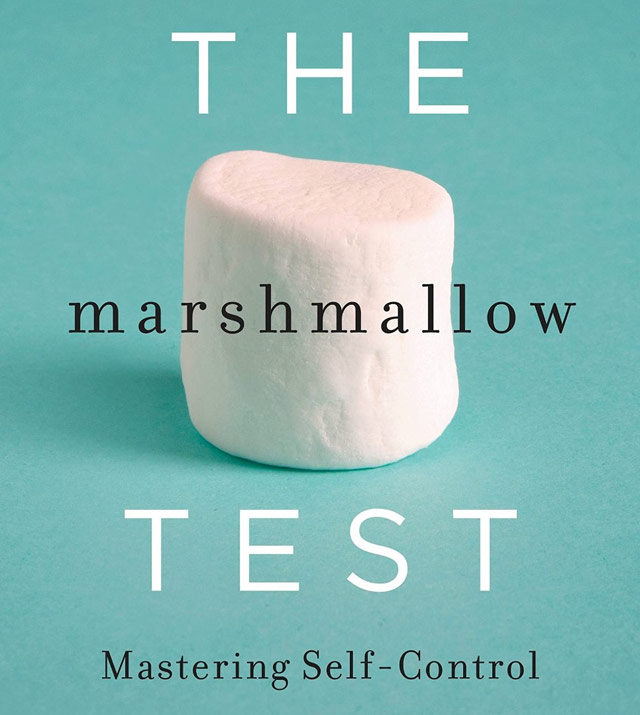The marshmallow test is a famous psychological experiment designed by Walter Mischel in the 1960s. Kids were given a single marshmallow but told they could have another if they refrained from eating the first one for 15 minutes. The results seemed to indicate a much greater degree of self-control amongst those children who were able to delay gratification, which led to better outcomes in their lives. From a New Yorker article about Mischel:
Once Mischel began analyzing the results, he noticed that low delayers, the children who rang the bell quickly, seemed more likely to have behavioral problems, both in school and at home. They got lower S.A.T. scores. They struggled in stressful situations, often had trouble paying attention, and found it difficult to maintain friendships. The child who could wait fifteen minutes had an S.A.T. score that was, on average, two hundred and ten points higher than that of the kid who could wait only thirty seconds.
But Mischel only tested ~90 kids from a single preschool. Researchers from UC Irvine and NYU recently redid the test with more kids that were more representative of the general population and found that household income was a big factor in explaining both the ability to delay and outcomes.
Ultimately, the new study finds limited support for the idea that being able to delay gratification leads to better outcomes. Instead, it suggests that the capacity to hold out for a second marshmallow is shaped in large part by a child’s social and economic background — and, in turn, that that background, not the ability to delay gratification, is what’s behind kids’ long-term success.
If you’re poor, you might look at the promise of future food somewhat dubiously…and not because of a lack of self-control:
The failed replication of the marshmallow test does more than just debunk the earlier notion; it suggests other possible explanations for why poorer kids would be less motivated to wait for that second marshmallow. For them, daily life holds fewer guarantees: There might be food in the pantry today, but there might not be tomorrow, so there is a risk that comes with waiting. And even if their parents promise to buy more of a certain food, sometimes that promise gets broken out of financial necessity.

The Marshmallow Test was developed by psychologist Walter Mischel to study self-control and delayed gratification. From a piece about Mischel in the New Yorker:
Once Mischel began analyzing the results, he noticed that low delayers, the children who rang the bell quickly, seemed more likely to have behavioral problems, both in school and at home. They got lower S.A.T. scores. They struggled in stressful situations, often had trouble paying attention, and found it difficult to maintain friendships. The child who could wait fifteen minutes had an S.A.T. score that was, on average, two hundred and ten points higher than that of the kid who could wait only thirty seconds.
Mischel has written a book about the test, its findings, and learning greater self-control: The Marshmallow Test: Mastering Self-Control.
The world’s leading expert on self-control, Walter Mischel has proven that the ability to delay gratification is critical for a successful life, predicting higher SAT scores, better social and cognitive functioning, a healthier lifestyle and a greater sense of self-worth. But is willpower prewired, or can it be taught?
In The Marshmallow Test, Mischel explains how self-control can be mastered and applied to challenges in everyday life — from weight control to quitting smoking, overcoming heartbreak, making major decisions, and planning for retirement. With profound implications for the choices we make in parenting, education, public policy and self-care, The Marshmallow Test will change the way you think about who we are and what we can be.
Here’s a video of the test in action:
Update: A recent study showed that the environment in which the test is performed is important.
Now a new study demonstrates that being able to delay gratification is influenced as much by the environment as by innate ability. Children who experienced reliable interactions immediately before the marshmallow task waited on average four times longer — 12 versus three minutes — than youngsters in similar but unreliable situations.
(thx, maggie & adam)
Jonah Lehrer, who is seemingly in a race with Michael Lewis these days to see who can write the most books and articles in a 12-month period, writes about self-control in the New Yorker…what it is, how it works, and how it affects things like achievement, happiness, etc. The article focuses on the efforts of Dr. Walter Mischel and the marshmallow test that he developed to measure self-control in young kids. With the marshmallow test, kids are given a mashmallow and they are told that they can eat it right away or, if they hold out, they can eat two marshmallows.
Once Mischel began analyzing the results, he noticed that low delayers, the children who rang the bell quickly, seemed more likely to have behavioral problems, both in school and at home. They got lower S.A.T. scores. They struggled in stressful situations, often had trouble paying attention, and found it difficult to maintain friendships. The child who could wait fifteen minutes had an S.A.T. score that was, on average, two hundred and ten points higher than that of the kid who could wait only thirty seconds.
I must have really underachieved on the SAT because as a four-year-old, I would have likely waited forever…I don’t like marshmallows.
Update: Radiolab recently tackled the marshmallow test on their podcast. There is also marshmallow test footage on YouTube. (thx, michael)
Update: Lehrer answers readers’ questions over on the New Yorker web site.






Stay Connected